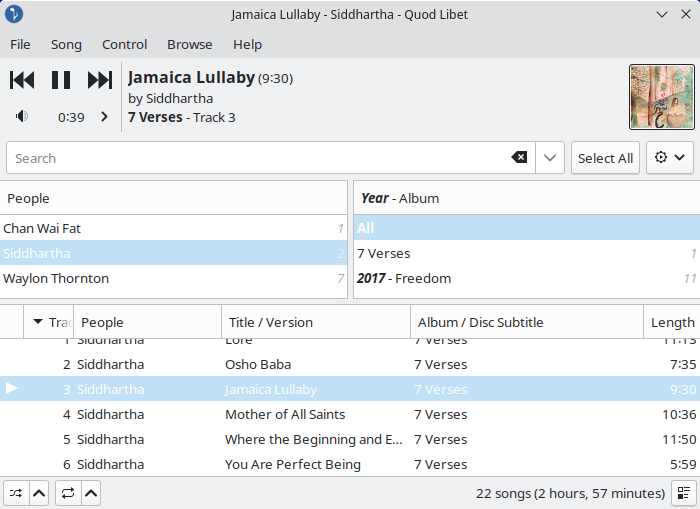Quod Libet is a music management program. It provides several different ways to view your audio library, as well as support for Internet radio and audio feeds. It has extremely flexible metadata tag editing and searching capabilities. It’s designed around the idea that you know how to organize your music better than the developers do.
Quod Libet lets you make playlists based on regular expressions and regular searches. The software also lets you display and edit any tags you want in the file. And it lets you do this for all the file formats it supports — Ogg Vorbis, FLAC, MP3, Musepack, and MOD.
Quod Libet is an GTK+-based application written in Python.
Also included is Ex Falso, a tag editor that has the same editing features found in Quod Libet, but does not play audio files.
Features include:
- Audio Playback:
- ReplayGain support.
- Multimedia key support.
- Real shuffle mode, that plays the whole playlist before repeating.
- Weighted (by rating) random playback.
- Proper ‘Previous’ support in shuffle mode.
- A play queue.
- Bookmarks within files (or playlists, with a plugin).
- Tag Editing:
- Full Unicode support.
- Make changes to many files at once.
- Make changes across all supported file formats.
- Tag files based on their filenames.
- Rename files based on their tags.
- No ugly %a, %t patterns; ugly but more readable <artist>, <title> instead.
- Fast track renumbering.
- Audio Library:
- Watch directories for new music and automatically load it when it appears.
- Hide songs on removable devices that may not always be there.
- Save song ratings and play counts.
- Lyrics downloading and saving.
- Internet Radio (“Shoutcast”) support.
- Audio Feeds (“Podcast”) support.
- User Interface:
- Simple user interface to Just Play Music if you want.
- Useful as a small window or maximized, no feeling cramped or wasted space.
- Album cover display.
- Full player control from a tray icon.
- Recognize and display many uncommon tags, as well as any others you want.
- Many ways to browse your library:
- Simple or regular-expression based search.
- Constructed playlists.
- iTunes/Rhythmbox-like paned browser, but with any tags you want.
- Album list with cover art.
- By directory, including songs not in your library.
- Python-based Plugins:
- Automatic tagging via MusicBrainz and CDDB.
- On-screen display popups.
- Last.fm/AudioScrobbler submission.
- Tag character encoding conversion.
- File Formats: MP3, Ogg Vorbis, FLAC, Musepack, MOD/XM/IT, Wavpack, MPEG-4 AAC.
- Player control and status information from the command line.
Website: quodlibet.readthedocs.io/en/latest
Support: User Guide
Developer: Joe Wreschnig, Michael Urman, and others
License: GNU General Public License v2.0

Quod Libet is written in Python. Learn Python with our recommended free books and free tutorials.
Return to Audio | Return to Music Players | Return to Internet Radio
| Popular series | |
|---|---|
| The largest compilation of the best free and open source software in the universe. Each article is supplied with a legendary ratings chart helping you to make informed decisions. | |
| Hundreds of in-depth reviews offering our unbiased and expert opinion on software. We offer helpful and impartial information. | |
| The Big List of Active Linux Distros is a large compilation of actively developed Linux distributions. | |
| Replace proprietary software with open source alternatives: Google, Microsoft, Apple, Adobe, IBM, Autodesk, Oracle, Atlassian, Corel, Cisco, Intuit, SAS, Progress, Salesforce, and Citrix | |
| Awesome Free Linux Games Tools showcases a series of tools that making gaming on Linux a more pleasurable experience. This is a new series. | |
| Machine Learning explores practical applications of machine learning and deep learning from a Linux perspective. We've written reviews of more than 40 self-hosted apps. All are free and open source. | |
| New to Linux? Read our Linux for Starters series. We start right at the basics and teach you everything you need to know to get started with Linux. | |
| Alternatives to popular CLI tools showcases essential tools that are modern replacements for core Linux utilities. | |
| Essential Linux system tools focuses on small, indispensable utilities, useful for system administrators as well as regular users. | |
| Linux utilities to maximise your productivity. Small, indispensable tools, useful for anyone running a Linux machine. | |
| Surveys popular streaming services from a Linux perspective: Amazon Music Unlimited, Myuzi, Spotify, Deezer, Tidal. | |
| Saving Money with Linux looks at how you can reduce your energy bills running Linux. | |
| Home computers became commonplace in the 1980s. Emulate home computers including the Commodore 64, Amiga, Atari ST, ZX81, Amstrad CPC, and ZX Spectrum. | |
| Now and Then examines how promising open source software fared over the years. It can be a bumpy ride. | |
| Linux at Home looks at a range of home activities where Linux can play its part, making the most of our time at home, keeping active and engaged. | |
| Linux Candy reveals the lighter side of Linux. Have some fun and escape from the daily drudgery. | |
| Getting Started with Docker helps you master Docker, a set of platform as a service products that delivers software in packages called containers. | |
| Best Free Android Apps. We showcase free Android apps that are definitely worth downloading. There's a strict eligibility criteria for inclusion in this series. | |
| These best free books accelerate your learning of every programming language. Learn a new language today! | |
| These free tutorials offer the perfect tonic to our free programming books series. | |
| Linux Around The World showcases usergroups that are relevant to Linux enthusiasts. Great ways to meet up with fellow enthusiasts. | |
| Stars and Stripes is an occasional series looking at the impact of Linux in the USA. | |